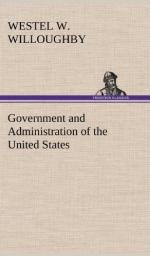The reasons why a national system of courts was necessary were in order that there might be some power:—
1. To give to laws an interpretation that would be uniform throughout the land. If there were thirteen independent courts, each giving Federal decisions on the same causes arising under the same national laws, what but confusion and contradiction could arise?
2. To settle disputes between the States and citizens of different States.
3. To construe and interpret the Constitution itself, and decide all disputes arising under it act of either Congress or of a State legislature contrary to the Constitution can therefore be valid. Hence, the necessity of some power which should have authority to determine the constitutionality of an act when brought into question, and—
5. There should be the power of determining the constitutionality of any act of a State legislature, and thus enforce upon State legislatures the restrictions laid upon them, such as, for example, the inability to lay impost duties, to pass laws violating the obligation of contracts, etc., or to regulate objects given exclusively to Congress. The manifest necessity of such a power may be best stated by using Hamilton’s own words (Federalist, 30):
“What would avail restrictions on the authority of the State legislatures without some constitutional mode of enforcing the observance of them? The States, by the plan of the Constitution, are prohibited from doing a variety of things, some of which are incompatible with the interests of the Union; others with the principles of good government. The imposition of duties on imported articles, and the emission of paper money are specimens of this kind. No man of sense will believe that such prohibition would be scrupulously regarded, without some effectual power in the government to restrain or correct infractions of them. This power must be either a direct negative on the State laws, or an authority in the Federal courts to annul such as might be in manifest contravention of the articles of Union.” * * * “These courts are to be the bulwarks of a limited constitution against legislative encroachments.”
These reasons were so strong that there was little or no objection in the constitutional convention to the creation of a national judiciary, but difficulty arose in determining its precise nature and powers. As we have learned, the difficulty to be overcome in drafting our new scheme of government was to satisfy State jealousies and interests, and preserve State rights of government, and yet to obtain a strong central government; and to harmonize State rights with Federal strength.




